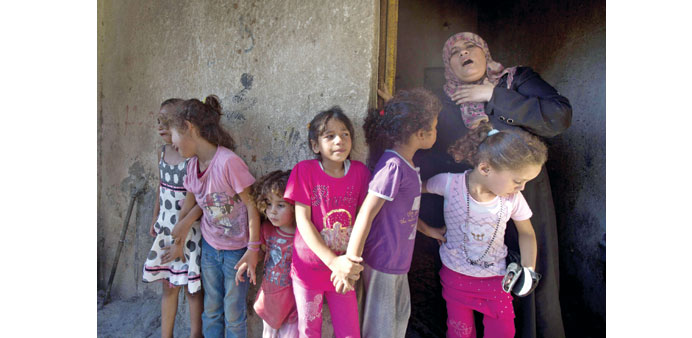A Hamas official says the Egyptian plan is rejected “in its current form” and that Hamas has notified Cairo of the changes it is seeking
Hamas demanded changes yesterday to an Egyptian proposal to end the deadly conflict with Israel in and around Gaza, a Palestinian official said.
Hamas’s demand came as the Palestinian death toll from Israel’s punishing air campaign, now in its ninth day, rose to 220 after the Islamist movement snubbed the truce plan on Tuesday even though it was briefly respected by Israel.
Hamas deputy leader Mussa Abu Marzuq met Egyptian officials in Cairo and set out the changes being sought, said Azzam al-Ahmed, a senior figure in Palestinian President Mahmoud Abbas’s Fatah movement.
“Hamas has rejected the proposal in its current form and demanded additions, like applying the 2012 agreement concerning border crossings with Israel, and demanded right for fishing up to 12 miles into the sea,” Ahmed told reporters in Cairo.
Senior Hamas official Ghazi Hamad said in Gaza City that the Egyptian plan was rejected “in its current form” and that Hamas had notified Egypt of the changes it was seeking.
“The initiative should include clear wording on fully lifting the blockade on Gaza, including opening all the crossings and releasing the rearrested prisoners from the (Gilad) Shalit deal in the West Bank,” Hamad said.
He was referring to a 2011 deal under which Shalit, an Israeli soldier held by Gaza militants for more than five years, was freed in exchange for scores of Palestinian prisoners.
Earlier this week, Egypt proposed a ceasefire to start at 0600 GMT on Tuesday and be followed by talks on easing the flow of goods into Gaza.
Israel initially accepted the Egyptian initiative, but later intensified its air strikes aimed at stamping out rocket fire by Gaza militants after Hamas rejected the plan.
Another Palestinian official said that Hamas and other factions were objecting to the term “hostilities” in the Egyptian initiative, complaining that “what they are doing is self-defence and resisting the occupation, but what the occupation is doing is aggression”.
He said he hoped there would be “meetings between Egypt and the factions as soon as possible to adjust the wording of the initiative and get to a ceasefire”.
The Palestinian president flew into Cairo yesterday to join the diplomatic efforts for an end to the violence.
He held talks with Abu Marzuq and was due to meet Egyptian Foreign Minister Sameh Shoukri and Arab League chief Nabil al-Arabi later, Ahmed said.
Today, he is due to meet President Abdel Fattah al-Sisi.
Middle East peace Quartet envoy Tony Blair held talks yesterday with Sisi and Shoukri, on his second visit to Cairo in a week to discuss the Gaza conflict.
Blair said Egypt’s initiative was designed “to allow all the issues that are at the heart of this problem … to be dealt with in a thorough and proper way.”
“There are demands by Hamas in respect of Gaza and there are demands by Israel in respect of security,” he said.
“But the purpose of this initiative is to allow people to come and discuss those issues, but in the meantime for the violence to stop and for the lives of the innocent to be saved,” Blair said at a joint news conference with Shoukri.
Shoukri said Egypt’s proposal aimed at “stopping military actions in order to address the situation in Gaza in the medium and long terms, and to give an opportunity to resume the peace process”.
Beach getaway turns into
a death trap for children
The sound of a blast cut through the air on Gaza’s beach, drawing people out of seafront buildings to see a crowd of terrified children sprinting along the sand.
They screamed as they ran, smoke rising behind them from an Israeli strike.
Panicked onlookers shouted at them to run away from the scene, and towards the safety of a hotel.
And then another blast hit the site, there was an orange glow and more smoke.
A hut used by fishermen was set on fire by the strike.
The children continued to run, but some of them were left behind. Four of them were killed.
Afterwards, emergency services spokesman Ashraf al-Qudra announced the names of the four, all cousins: Ahed Atef Bakr, aged 10; Zakaria Ahed Bakr, also 10; Mohamed Ramez Bakr, 9, and Ismail Mohamed Bakr, 11.
The other children, some crying, and others bleeding, ran into a hotel, where staff and journalists scrambled to help them.
Thirteen-year-old Hamed Bakr had shrapnel in his chest and was crying “it hurts, my chest hurts.”
Those present worked to clean and dress his wounds and those of two other injured children while ambulances were called.
It was unclear if the strikes were the result of naval shelling, which frequently hits part of the Gaza coastline, or came from Israeli warplanes overhead.
The four bodies of the children were later taken to Abu Hasira mosque, near where the boys had died.
The boys were laid out, wrapped in the yellow flags of the Fatah party—the Palestinian rival to the Hamas movement—in front of mourners.
“We come from God and to God we shall return,” the imam overseeing the funeral prayers said.
Relative Khamis Bakr, 47, shook with anger as he spoke.
“They were playing on the beach, they’d gone there to get away from Beach Camp because there was a lot of shelling there,” he said.
“They walked right into their deaths.”
Zakaria’s grandfather pushed through the mourners to the four small bodies and kneeled down, apparently in shock.
“The children were just playing, they had told one of their mothers that they were going to the beach,” he said.
“We didn’t know anything had happened, and then we heard on the radio that there had been a strike, and people from the Bakr family had been killed.
“And then I knew that the children were gone.”

